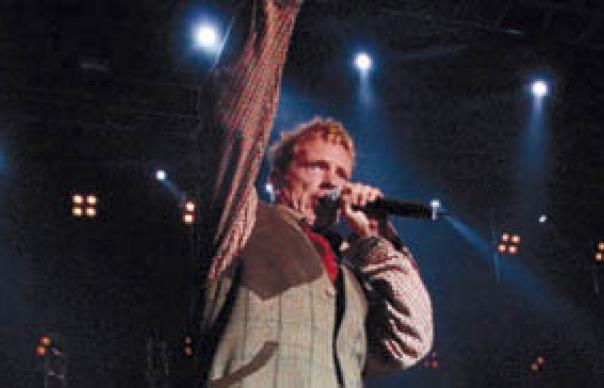Between November 1975 and January 1978, the Sex Pistols played approximately 130 gigs. Judging by the number of dewy-eyed forty- and fiftysomethings who claim to have witnessed them, each one must have taken place at a packed Wembley Stadium, instead of in front of half a dozen people on the London pub-rock toilet circuit. It’s this ongoing desire to say that you’ve seen the Pistols that accounts for their ability to sell out five nights at the Brixton Academy in November 2007, as documented on this DVD. Of course, this isn’t the first time the Pistols have reformed. Eleven years ago, you could have seen them playing at Finsbury Park in front of 30,000 anarcho-crusties and neo-Nazi Oi! scum who, like Japanese soldiers stranded on remote Pacific islands decades after VJ Day, refused to believe that the punk wars had ended. What’s refreshing about the Brixton residency is the change in atmosphere. No longer even pretending to be seditious, the Sex Pistols are now part of the social glue holding together our fragile notion of Englishness. As they march out onto the stage to the accompaniment of Vera Lynn’s “There’ll Always Be An England”, Union Jack knotted hankies and unapologetic beer bellies ahoy, it’s as gleefully patriotic as The Last Night Of The Proms, or an England football international. “Like you, we had a manager called McLaren,” announces Lydon. “He was also a cunt.” Julien Temple’s film details this good-natured idiocy wonderfully, spending as much screen time documenting the audience as the sub-heavy-metal histrionics of the band. Where Scorsese’s audience in Shine A Light seemed to be a specially invited crowd of glamorous young models, here Temple’s wandering cameras capture the sheer diversity of Pistols fans today – balding fortysomethings, curious wentysomethings, baffled teens, Japanese tourists, besuited accountants and ageing crusties. And the band finally seem comfortable with their archetypes – Lydon the pantomime dame, Paul Cook the Dickensian chimney sweep, Steve Jones the unpleasantly priapic career criminal and Glen Matlock the floppy-fringed art-school dropout. These indentities becomes clearer in the bonus DVD, a film called The Knowledge, where Cook, Jones and Matlock take us on a nostalgic tour around the west London of their childhood, revisiting old Pistols haunts like WWI veterans at Paschendale. Meanwhile Lydon narrates a lengthy bus journey across London, wistfully reporting how his beloved “shithole” has been gentrified, moaning about spectacular modern architecture like City Hall, the London Eye, the Gherkin and the Emirates Stadium (“I kind of agree with Prince Charles on this”). Intercut with some impressive (and often hilarious) vintage footage, you can see it as the third and final –and most good-natured – part of Temple’s trilogy of Sex Pistols films. EXTRAS: The Knowledge, an 80-minute film of the Pistols’ guide to London, also directed by Temple. JOHN LEWIS
Between November 1975 and January 1978, the Sex Pistols played approximately 130 gigs. Judging by the number of dewy-eyed forty- and fiftysomethings who claim to have witnessed them, each one must have taken place at a packed Wembley Stadium, instead of in front of half a dozen people on the London pub-rock toilet circuit. It’s this ongoing desire to say that you’ve seen the Pistols that accounts for their ability to sell out five nights at the Brixton Academy in November 2007, as documented on this DVD.
Of course, this isn’t the first time the Pistols have reformed. Eleven years ago, you could have seen them playing at Finsbury Park in front of 30,000 anarcho-crusties and neo-Nazi Oi! scum who, like Japanese soldiers stranded on remote Pacific islands decades after VJ Day, refused to believe that the punk wars had ended.
What’s refreshing about the Brixton residency is the change in atmosphere. No longer even pretending to be seditious, the Sex Pistols are now part of the social glue holding together our fragile notion of Englishness. As they march out onto the stage to the accompaniment of Vera Lynn’s “There’ll Always Be An England”, Union Jack knotted hankies and unapologetic beer bellies ahoy, it’s as gleefully patriotic as The Last Night Of The Proms, or an England football international. “Like you, we had a manager called McLaren,” announces Lydon. “He was also a cunt.”
Julien Temple’s film details this good-natured idiocy wonderfully, spending as much screen time documenting the audience as the sub-heavy-metal histrionics of the band. Where Scorsese’s audience in Shine A Light seemed to be a specially invited crowd of glamorous young models, here Temple’s wandering cameras capture the sheer diversity of Pistols fans today – balding fortysomethings, curious wentysomethings, baffled teens, Japanese tourists, besuited accountants and ageing crusties.
And the band finally seem comfortable with their archetypes – Lydon the pantomime dame, Paul Cook the Dickensian chimney sweep, Steve Jones the unpleasantly priapic career criminal and Glen Matlock the floppy-fringed art-school dropout.
These indentities becomes clearer in the bonus DVD, a film called The Knowledge, where Cook, Jones and Matlock take us on a nostalgic tour around the west London of their childhood, revisiting old Pistols haunts like WWI veterans at Paschendale. Meanwhile Lydon narrates a lengthy bus journey across London, wistfully reporting how his beloved “shithole” has been gentrified, moaning about spectacular modern architecture like City Hall, the London Eye, the Gherkin and the Emirates Stadium (“I kind of agree with Prince Charles on this”).
Intercut with some impressive (and often hilarious) vintage footage, you can see it as the third and final –and most good-natured – part of Temple’s trilogy of Sex Pistols films.
EXTRAS: The Knowledge, an 80-minute film
of the Pistols’ guide to London, also directed by Temple.
JOHN LEWIS



